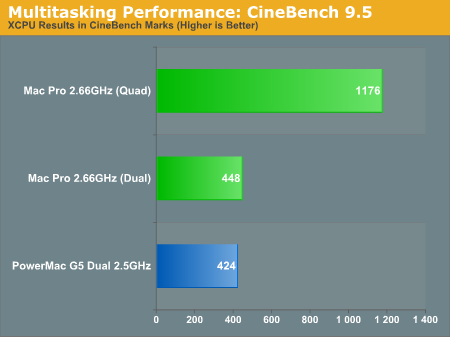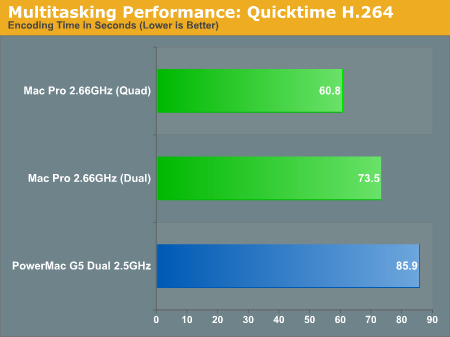Apple's Mac Pro - A True PowerMac Successor
by Anand Lal Shimpi on August 16, 2006 12:27 PM EST- Posted in
- Mac
Multitasking Performance - The Quad Core Advantage
We're almost at the end of the review and so far we've hardly shown any performance benefit thanks to quad cores; just about all of the benchmarks we've presented here today could be duplicated if you only had a single Xeon in the Mac Pro instead of two.
It seems that many multithreaded applications are specifically targeted at dual core systems, and scaling above and beyond two simultaneous (and CPU intensive) threads just isn't where it needs to be for four cores to make a big difference. With the trend in CPU architectures being to significantly ramp up the number of cores, software will follow, but for now truly taking advantage of four cores is much like the early days of dual core processors: you either need an application that is specifically designed to scale to four cores (e.g. CineBench/3D rendering), or you need to be a heavy multitasker.
We've already shown what the former can bring, but what about the latter? How much of a benefit do you gain from having four cores at your disposal? To find out we combined two of our benchmarks - the multithreaded CineBench 9.5 test and our Quicktime H.264 encoding test. We started the H.264 encode first and then started the CineBench rendering test; we reported scores for both.

With only two cores, the CineBench results between the PowerMac G5 2.5GHz and the Mac Pro 2.66GHz are reasonably close, with the Mac Pro only holding a < 6% advantage. The H.264 encoding performance is a bit more favorable to the Mac Pro, with the dual core 2.66GHz solution outperforming the G5 by 14%.

Enabling the remaining two cores on the Mac Pro however really changes the picture; the four core Mac Pro is 1.6x faster than the hypothetical two core version in CineBench and at the same time is 17% faster in the H.264 encoding test.
It's not too surprising to expect that the more CPU intensive tasks you run simultaneously, the more of a performance improvement you'll see with four cores vs. two. It's just like the early days of dual core CPUs; just wait until Apple throws two quad core Clovertowns in the Mac Pro, then we'll really start running out of things to do with them.










96 Comments
View All Comments
tmohajir - Thursday, August 17, 2006 - link
I had the same question. I was debating whether to by 2 x 512MB or 1GB, and then thought it might affect performance if I went with the 1GB sticks. I think for now the best bet would be to buy 2 512s so that each branch has a channel with the same amount of memory. Then if I want to upgrade later, move all 4 512s to riser 1, and buy 2 1GB dimms when the price drops a little more and stick them in riser 2. So that way you still have 2GB total per branch.dborod - Thursday, August 17, 2006 - link
I decided to order my MacPro with 4 x 512 MB dimms so as to be able to fully utilize the available memory bandwidth. It seemed the easiest and safest approach for now.dborod - Thursday, August 17, 2006 - link
I decided to order my MacPro with 4 x 512 MB dimms so as to be able to fully utilize the available memory bandwidth. It seemed the easiest and saQuestar - Wednesday, August 16, 2006 - link
Why use MP3 encoding for performace testing in a multi cpu environment? MP3 encoding is not very threadable, and most likely is not threaded to any great extent in iTunes.Griswold - Thursday, August 17, 2006 - link
Somebody obviously has never used the multithreaded encoder of the LAME MT project. I see gains of up to 50% with that. Sure, that may not be relevant for a mac pro user, but it is proof that MP3 encoding benefits from SMT.Questar - Thursday, August 17, 2006 - link
Griswald stikes again.Yes I've heard of LAMEMT. So how's that sound quality you're getting without a bit resevoir? Pretty crappy I'll bet.
Griswold - Friday, August 18, 2006 - link
Oh give me a break nutsack. Dont pretend you know what you're talking about here, as it doesnt match your first (false) post - you obviously never used LameMT. Disabling bit reservoir may come with a certain loss of quality, but its not nearly as much as you (or the poster above) want it to make to be. I'm willing to bet 95% of the people using mp3 wont notice the difference.I'm listening to the same song encoded with standard Lame and LameMT and the quality is virtually the same. Of course, you'll now say your ears are so much better, you got so much better audio equipment and what not.. but meh, it's just questdork talking.
michael2k - Saturday, August 19, 2006 - link
The same 95% of the population who purchase tracks from the iTMS I bet :)Questar - Friday, August 18, 2006 - link
Thanks for the best laugh I've had all week!I really needed it!!
saratoga - Thursday, August 17, 2006 - link
Yeah but you also lose quality, so very few people use it.
Not exactly. LAMEMT is only multithreaded when you use parts of the MP3 standard that can be multithreaded. Typical MP3 encoding as done by lame, itunes, xing, etc simply can not be multithreaded. LAMEMT can be multithreaded because it disables certain features that are incompatable and then implements software pipelining.
The LAME devs have talked about trying to work around this problem in the past, but so far most people seem to think its just not worth the effort because the speed up is much worse then just running two copies of LAME (which gives a 100% speedup verses the 50% you saw), and of course the unresolved questions about just how badly quality would be hurt by rewriting LAME profiles from scratch to use the approach in LAMEMT.